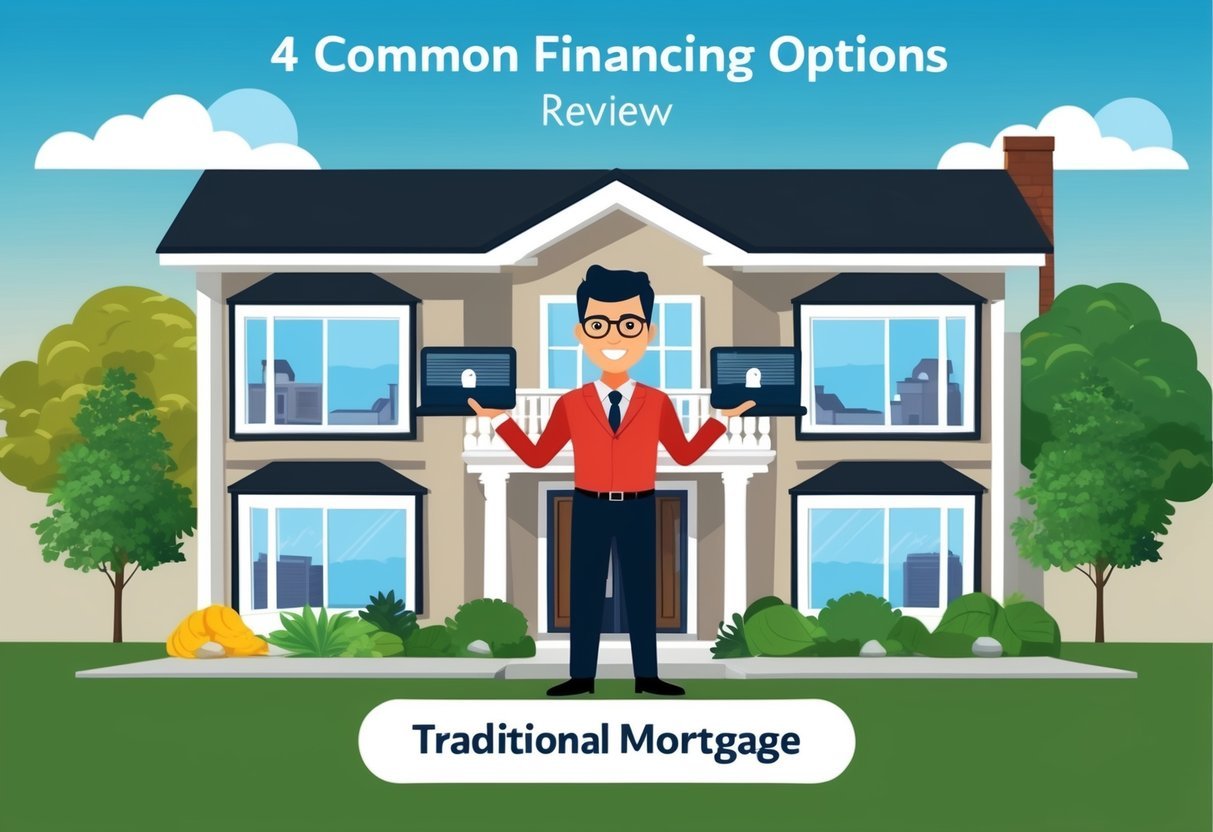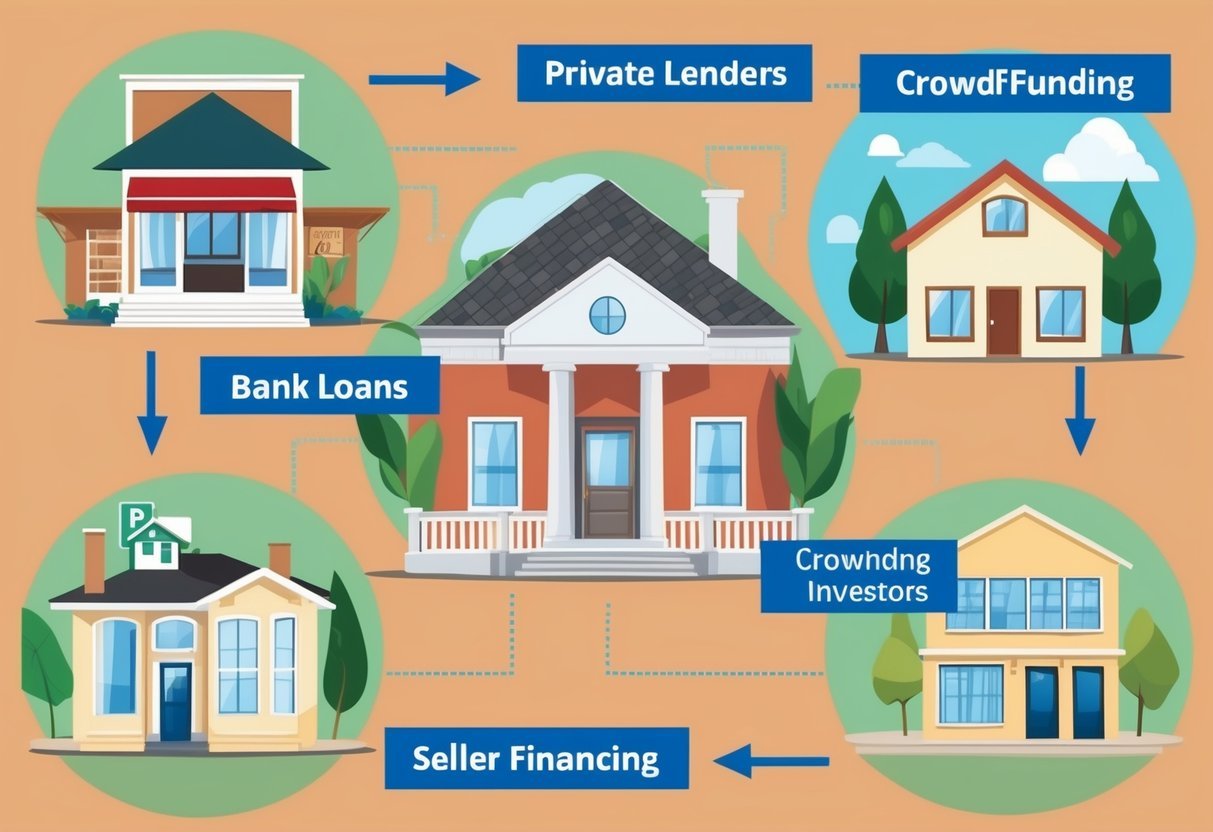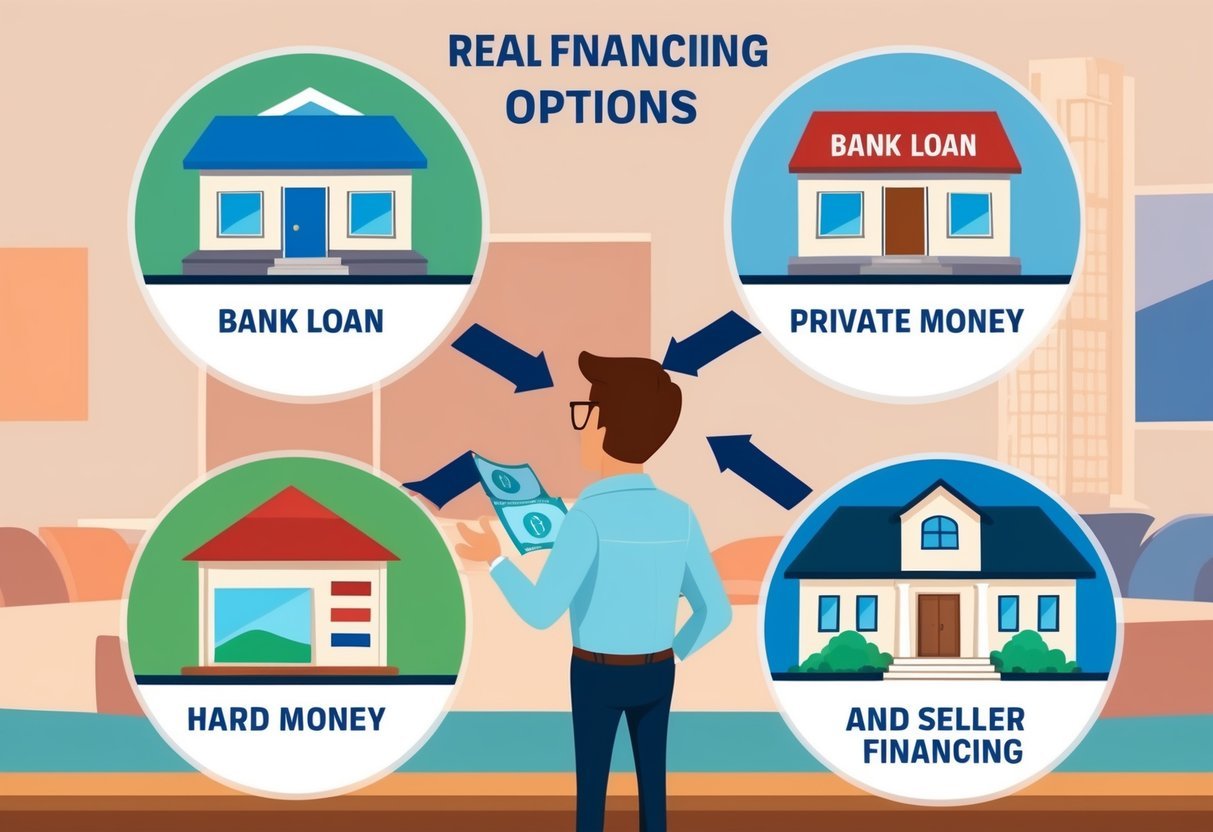Navigating the landscape of real estate investment can be complex, especially when it comes to financing.
As investors, understanding the available financing options is crucial to making informed decisions. Determining the best financing option is essential to aligning with our investment goals and ensuring sustainability.

There are numerous avenues available, each catering to different scenarios and investor needs.
Considering the benefits and limitations of each option allows us to strategically select the most viable path for funding our real estate ventures.
1) Traditional Mortgages

Traditional mortgages are a staple for many real estate investors seeking stable and long-term financial strategies.
These loans are typically secured through banks and credit unions, which provide the benefits of predictable payment structures and interest rates.
We often find that the fixed-rate options allow us to plan our investments with greater confidence.
Our approach to obtaining a traditional mortgage often begins with evaluating our creditworthiness, as lenders prioritize borrowers with strong credit histories.
This step is crucial, as it influences the interest rates and terms we can secure.
Down payments are generally required, and the amounts can vary based on the lender’s policies and the property type.
We appreciate traditional mortgages for their relatively low interest rates compared to alternative financing methods.
Such rates enable us to maintain lower monthly payments, thereby freeing up capital for other investment opportunities.
By choosing this option, we align our financial objectives with the benefits of market stability and long-term planning.
One aspect we must navigate is the documentation process.
It typically involves a thorough review of our financial history to assess our ability to repay the loan.
This detailed evaluation can seem challenging, yet it plays a vital role in obtaining favorable loan terms.
However, the approval process can be lengthy.
We need to prepare for a waiting period that sometimes affects the speed at which we can close on a property.
Despite this, the advantages of securing a mortgage with favorable terms often justify the effort and time involved.
2) Hard Money Loans
Hard money loans are an essential tool for us as real estate investors.
These loans are primarily asset-based, meaning they rely on the value of the property used as collateral rather than the borrower’s creditworthiness.
This can be advantageous for those of us who may not have perfect credit but own valuable assets.
We often consider hard money loans when we need to secure funding quickly.
Traditional loans can take weeks or even months to process, but hard money lenders usually provide funds in a matter of days.
This speed is crucial when we are engaged in time-sensitive transactions.
These loans typically have higher interest rates than conventional loans, often ranging from 10% to 15%.
While this might seem steep, the flexibility and speed offered by hard money lending can offset the cost when timing is essential for our projects.
The loan terms for hard money loans are usually shorter, ranging from six months to a few years.
This makes them particularly useful for fix-and-flip projects or investments where we aim to sell the property relatively quickly.
When using hard money loans, we must be aware of the potential for lower loan-to-value (LTV) ratios.
Lenders might offer a maximum of 70% of the property’s after-repair value (ARV), so we need to have a portion of our funds readily available.
Understanding these loans allows us to leverage our existing assets effectively, enabling us to complete deals that might otherwise have been out of reach.
3) Private Money Lenders
Private money lenders offer a unique avenue for real estate financing.
Unlike traditional financial institutions, these lenders are often individuals or groups looking to invest their personal funds for higher returns.
This flexibility can be beneficial for us as real estate investors needing quick and accessible financing.
One of the key benefits of private money lending is the speed of transaction.
Traditional banks might take weeks or even months to process loans, whereas private lenders can close deals much faster.
This allows us to seize real estate opportunities as they arise without delay.
We often find that private money lenders offer more flexible terms than conventional lenders.
This might include negotiating interest rates, repayment schedules, and loan durations to suit our unique needs.
Such flexibility can be particularly advantageous when dealing with properties requiring renovation or short-term holding.
While private money lenders might charge higher interest rates compared to traditional loans, the accessibility and convenience they offer can outweigh this drawback.
Financing through private means is particularly appealing for those of us with non-traditional income sources or less-than-perfect credit scores.
It is essential for us to establish and maintain good relationships with private lenders.
Trust is a significant factor in these transactions, and a solid track record can lead to future financing opportunities.
Networking within real estate circles helps us connect with potential lenders and understand their criteria.
For some investors, private money lending represents a critical component of their strategy, enabling the purchase of distressed or undervalued properties.
Whether we are acquiring a new investment or refinancing an existing one, these lenders provide an invaluable resource within the real estate industry.
4) Real Estate Crowdfunding

Real estate crowdfunding has become a popular way for us to diversify our investment portfolios without purchasing entire properties.
By pooling resources with other investors, we can access larger deals and potentially earn returns from rental income or property appreciation.
This option is particularly appealing for those of us who may not have the capital to individually purchase and manage properties.
Many platforms offer the ability to invest with relatively low minimum amounts, often making it accessible to a broader range of investors.
Platforms like Fundrise and RealtyMogul have gained attention for providing detailed information on investment opportunities, allowing us to make informed decisions.
It’s important to note that some platforms are only open to accredited investors, which could limit access for some.
Crowdfunding platforms offer a variety of property types and investment structures.
As investors, we can choose from residential, commercial, or mixed-use properties, thereby tailoring our investments to match our risk tolerance and financial objectives.
The transparency offered by these platforms can help us better understand where our money is being invested.
However, we must thoroughly research each platform and the specific deals before committing funds, considering factors such as potential risks, fees, and the platform’s track record.
Real estate crowdfunding provides a convenient way for us to become part-owners of real estate projects.
This collective approach to investing can enable us to benefit from markets we might not otherwise access individually, while also spreading our investment risk.
Understanding Financing Options

Real estate investors have several financing options available, each with unique advantages and considerations.
It’s essential to comprehend these options to make informed decisions that align with our financial goals and investment strategies.
Definition and Importance
Financing options in real estate are various methods through which investors can acquire funds to purchase, develop, or refinance properties.
These options include commercial loans, blanket mortgages, and others tailored for real estate investment.
The importance of understanding these lies in the impact they have on our investments’ profitability and risk.
By selecting the right financing, we can leverage our capital, maximize returns, and effectively manage our portfolios.
Awareness of different terms, interest rates, and repayment schemes is crucial to optimize financial gains.
Factors Affecting Choice
Several factors influence our choice of financing in real estate.
Key considerations include the investment type, property value, and interest rates available.
For instance, commercial loans might be suitable for income-generating properties, while blanket mortgages benefit those investing in multiple properties.
Additionally, personal financial status and creditworthiness significantly impact the financing terms we can access.
It’s vital to weigh risks and benefits associated with each option to ensure it suits our investment needs.
Analyzing market conditions and potential tax implications further aids in making a well-informed decision.
Familiarity with these elements empowers us to select financing that aligns with our long-term investment objectives.
Alternative Financing Methods

Exploring alternative financing can unlock unique investment opportunities and allow us to diversify our real estate portfolios.
Private Money Lenders
Private money lenders are individuals or private entities that lend capital to real estate investors.
Unlike traditional banks, these lenders offer more flexible terms and faster approval processes.
They often focus on the property’s potential value rather than the borrower’s creditworthiness.
This flexibility can be crucial when we need to seize time-sensitive investment opportunities or when our credit profile doesn’t meet traditional lending criteria.
The interest rates from private money lenders can be higher compared to other financing methods.
However, the speed and convenience can outweigh these costs for many of us.
It’s important to carefully vet potential lenders and clearly outline terms in the agreement.
Establishing strong relationships with private lenders can enhance our credibility and open doors to more funding options.
Real Estate Investment Trusts (REITs)
Real Estate Investment Trusts (REITs) allow us to invest in real estate without directly purchasing properties.
These trusts own and manage a diversified portfolio of income-producing real estate assets.
Investing in REITs provides us with the benefit of liquidity, something that’s often lacking in direct property investments, as REIT shares are typically traded on major stock exchanges.
REITs also offer a steady income stream in the form of dividends, particularly appealing for investors seeking passive income.
It’s essential to conduct thorough research on different REITs, focusing on their management team’s track record, the types of properties held, and the dividend history.
By diversifying our investments through REITs, we can spread risk while still engaging in the real estate market.
Frequently Asked Questions

In the world of real estate investing, various financing options offer strategic benefits and potential challenges.
Understanding these alternatives aids in navigating the financial landscape and making informed decisions.
What are the most popular financing options available to real estate investors?
Common financing options include traditional mortgages, which provide long-term loans with fixed or adjustable rates.
Hard money loans offer short-term funding, often for property rehabilitation.
Private money lenders can be flexible in terms, while real estate crowdfunding allows investors to pool resources for larger projects.
How do investors typically finance investment properties with no money down?
Investors often use creative financing strategies like seller financing, where the seller provides the loan, or lease options, allowing possession with little upfront investment.
Partnering with another investor who provides capital in exchange for equity can also reduce out-of-pocket expenses.
What are the primary considerations when choosing a financing method for real estate investments?
Key considerations include interest rates, loan terms, and repayment schedules.
We must also consider the property’s projected income and our investment strategy.
It’s crucial to assess the risk tolerance, investment goals, and potential returns before selecting a financing option.
What are the differences between residential and commercial real estate financing?
Residential financing typically involves longer loan terms and lower interest rates.
In contrast, commercial loans are often shorter in duration and based on projected income from the property.
Lender requirements in the commercial sector can be stricter, focusing more on the property’s income potential than personal creditworthiness.
How do government-backed loans work for real estate investors?
Government-backed loans, such as those from the FHA or VA, often have lower down payments and more favorable terms.
These loans are typically reserved for owner-occupied properties.
However, programs like Fannie Mae’s HomeStyle Renovation loan can help investors in specific contexts.
Can you obtain a loan for a rental property based on future rental income?
Yes, lenders may consider the projected rental income when assessing a loan application for a rental property.
This can help qualify for larger loan amounts.
Lenders often require documentation, like a rental appraisal, to estimate potential income accurately.

